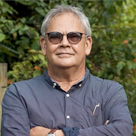
Alain Gordon Gentil
Writer, journalist and film producer
Economy / Mauritius
“There has been a great deal of consistency in economic choices”
With its historic emphasis on implementing Western democratic values, Mauritius has chartered a unique course in Africa since its 1968 independence. Visitors can expect a warm welcome, and should take the time to discover the local culture, says Mauritian writer, journalist and film producer Alain Gordon Gentil.
What enabled Mauritius to become Africa’s top place for doing business?
Since independence on March 12, 1968, Mauritius has achieved a rather exceptional course. From a monoculture country, to an industrial country and finally a country of financial service and information technology, we can be proud of the progress made. This success is due, in my opinion, to crucial choices at crucial periods. Strategic choice that demonstrates a certain vision of our post-independence leaders. Mauritius chose to align on European standards ideologically, namely free market economy. One must remember that all around us African countries experiencing their new independence chose “socialism,” not to say communism. And most importantly, since independence Mauritius have given a lot of attention to education and health. This might explain our edge on the rest of Africa where so many of leaders were financing prestige projects, leaving their population in misery.
What best characterizes Mauritius as a nation today?
It’s so difficult to define what a nation is. Even more when it is a multicultural, multiracial population. We can be defined as a small country whse inhabitants learned, sometimes the hard way, to live together. The smallness of the territory has also forged what has become our character. We quickly realized that we had no choice but to live together. We were on the same boat — in addition, a very small boat — and it was either we moved together or we drowned together.
What can other African nations learn from Mauritius’ development model?
I believe that what characterizes our development model is that since independence there has been a great deal of consistency in economic choices. All successive governments have never questioned two important things: the economic model and foreign policy. We have a liberal model supported by a welfare state and a firm alignment with Western democracies.
What are Mauritius’ main expected challenges for the next decades?
The main challenges facing the country are economic. But not only. I think we have to question our very type of development. The economic gap that is growing day by day between rich and poor is very preoccupying. When we look closely we note that the middle class is getting poorer each day. And we know that it is often the middle class that drives the economy of a country. We must also immediately stop the development of land for foreigners. Relying on the sale of land in a tiny country is a short-sighted policy. Not to mention that the IRS (Integrated Resort Scheme) are sold up to 75 million rupees for a house, in an immediate environment where poor families live at six or seven in a house of 75 square meters. All this can lead to social tensions.
What 10 things should visitors and investors know about Mauritius?
The visitors who do us the honor to visit us must first meet the Mauritians. From there he will better understand the country and they will get an idea. If a visitor comes all inclusive, and locks himself in a hotel to eat an all-inclusive buffet and smell monoi from morning to night, he will have little chance to know who we are and what makes this little island magic.
